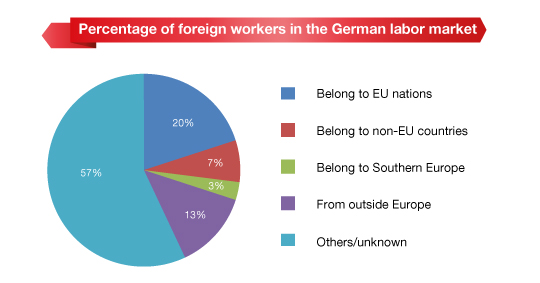Recent studies indicate that Germany will need about 260,000 new migrant workers until 2060 to meet the shortage of skilled workers. Out of this, the country will need about 1.4 million workers from non-EU (European Union) nations.
Germany has for long relied on foreign workers to meet labor shortages.

However, with the growth in the economy, there are not enough skilled workers. The shortage has led to production delays in 20% of German companies. More than 50% of companies feel that the shortage of labor is the biggest risk to their business.
The skills shortage in the country can be attributed to these factors:
- An aging population will lead to a decrease in the labor force by 16 million. This is almost a third of the present numbers
- Fall in the number of migrant workers from the EU because after convergence fewer EU workers would be willing to leave their country for work.
- A major percentage of existing refugees are unable to speak German or lack basic skills
- Only 14% of these refugees have specialized skills required for jobs
|
To solve the skill shortage crisis, the German government passed new immigration laws in May this year in a bid to attract skilled workers from outside. One of the decisions was to provide easy access to jobseekers to come to the country and look for a job here.
This is the job seeker visa. With this visa, you can stay in Germany for six months and look for a job here. Features of this visa are:
- You need not have a job offer from a German company to apply for this visa.
- If you find a job in the six months you are in Germany on this visa, you can later change it to a work permit
- If you do not find a job within the six months, you will need to leave Germany immediately.

- You should be at least 18 years of age to apply for this visa
- You must have a Bachelor or Master’s degree from a German university or other equivalent foreign degrees
- Proof that you have the required funds to cover your expenses for the duration of your stay in Germany
Steps to get the job seeker visa:
Once you have checked your eligibility requirements, this is the process to get your job seeker visa.
Step 1: Gather all the required documents: You will have to submit a list of documents along with your application. These include:
- A valid passport with an expiry date three months after the validity of the applied visa expires.
- Your curriculum vitae with details of your education and work experience.
- Proof of your educational qualifications.
- Certificates of your previous work experience.
- Proof of your language proficiency in the form of your IELTS or TOEFL test scorecard and German language certification at A1 level.
- A cover letter explaining why you need a jobseeker visa, your plan to find employment in Germany and your alternative actions if you do not find a job within the six months.
- A health insurance policy with a validity of six months. You will need to get this policy from a company authorized with the country.
- Blocked bank account as proof of your financial resources.
|
ZAB Statement of Comparability: You can get a statement of comparability for your educational qualifications from the German government. Called the ZAB statement of comparability it gives the German equivalent of your higher education qualification, its professional and academic usage. The statement will help German employers to assess your educational level and relevant work experience when you apply for a job. |
Step 2: Get an appointment from the embassy-Get an appointment from the embassy to submit the application form. Get an appointment from the embassy one month ahead of the date you intend to apply for the visa.
Step 3: Submit the online application- Fill the online application form and submit it with the required documents.
Step 4: Attend the visa interview- Attend the visa interview at the embassy or consulate at the designated time.
Step 5: Pay the visa fees.
Step 6: Wait for the visa processing– Your visa application will be examined by a visa officer or the home office in Germany. The waiting time can be between one to two months before you know the outcome of your application.
Advantages of German job seeker visa:
- The job seeker visa allows you to search for a job in a duration of six months.
- The visa is processed under six months making it easy to plan your course of action. Compared to other EU countries it is a quick visa decision.
- Gives you ample time to find a job that is a fit for your skills and qualifications
- Provision to apply for an EU blue card once you secure a job.
- After 5 years of staying in Germany with a work visa, you will be eligible to apply for permanent residency.
The job seeker visa gives you a golden opportunity to find your desired job in Germany. With the serious skill shortage in the German labor market, there is every chance that you will be successful in your search.
Take the help of an immigration consultant who will help you with the visa application process so that you get your job seeker visa.
If you found this blog engaging, you may also like…




A comprehensive guide to German jobseeker visa application
Posted on August 7, 2019